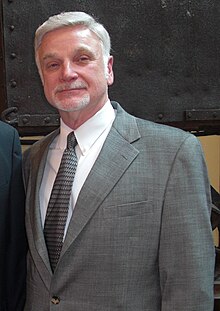Cecil Roberts (labor unionist): Difference between revisions
No edit summary Tags: Mobile edit Mobile web edit |
No edit summary Tags: Mobile edit Mobile web edit |
||
| Line 12: | Line 12: | ||
|known_for = President, United Mine Workers of America |
|known_for = President, United Mine Workers of America |
||
|occupation = Miner; Labor leader |
|occupation = Miner; Labor leader |
||
|alma_mater= [[West Virginia University Institute of Technology]] |
|||
|nationality = American |
|nationality = American |
||
}} |
}} |
||
Revision as of 05:12, 21 December 2016
Cecil Roberts | |
|---|---|
 Roberts in 2009 | |
| Born | October 31, 1946 |
| Nationality | American |
| Alma mater | West Virginia University Institute of Technology |
| Occupation(s) | Miner; Labor leader |
| Known for | President, United Mine Workers of America |
Cecil Roberts (born October 31, 1946) is a miner and president of the United Mine Workers of America (UMWA).[1] He is also a vice president of the AFL-CIO, and sits on the AFL-CIO's executive council.
Early life
Roberts was born on Halloween in 1946. He grew up along Cabin Creek in Kanawha County, West Virginia.
After serving in the United States military and doing a tour of duty in the Vietnam War, Roberts went to work as a miner in 1971. He became active in Miners for Democracy, the reform movement in the United Mine Workers which sprung up around miner Arnold Miller. In 1977, he was elected vice president of District 17.
In 1982, Roberts was elected vice president of UMWA. His running mate was Richard Trumka, who became the union's president.
Roberts graduated from the West Virginia Institute of Technology with a bachelor's degree in 1987.
In 1989, Roberts was the on-site leader and strategist and chief negotiator in UMWA's 10-month strike against Pittston Coal.
Presidency of UMWA
When Trumka resigned the presidency of UMWA on December 22, 1995, after being elected secretary-treasurer of the AFL-CIO, Roberts assumed the presidency in his stead.
In 1996, Roberts won agreement from coal mine operators to re-open UMWA's national coal agreement. It was the first time the contract had been re-opened in the union's history, and Roberts won substantial wage increases.
In 1997, Roberts was elected president of UMWA in his own right to a new five-year term. For the first time in UMWA history, the entire leadership team slate ran unopposed.
In 1998, Roberts negotiated a new national coal agreement.
In 2000, Roberts won re-election a second time. Although his term was not due to expire, delegates to UMWA's March 2000 convention approved a resolution to move the election up so balloting would not coincide with negotiations for a new bituminous coal contract. Again, Roberts and his slate ran unopposed.
In 2001, Roberts bargained a new, five-year national coal agreement. The new agreement included significant pension increases and "30-and-out" language that allowed miners with 30 years of service to retire with full benefits at any age.
In September 2003, Roberts called an International Special Convention to restructure UMWA. Delegates approved proposals to eliminate all international vice president positions, and combine the international executive board member, district president and district secretary-treasurer positions into one office called international vice president. Delegates also approved moving the 2005 presidential election up to 2004.
In 2004, Roberts was re-elected a third time as president of UMWA.
In December 2005, Roberts negotiated a new national coal agreement which contained the highest pay raises since 1974. Health benefits were maintained, and coal companies will increase contributions to the UMWA Pension Fund by more than $500 million.[2]
In 2008, Roberts received the Eugene V. Debs Foundation Award.[3]
References
- ^ http://www.umwa.org/bios/biocr.html "Cecil E. Roberts, President." United Mine Workers of America, no date. Accessed January 10, 2007.
- ^ "UMW Approves Contract, Gets Highest Pay Hike Since 1974." Lexington Herald-Leader. December 22, 2005.
- ^ http://www.eugenevdebs.com/pages/foundation.html Eugene V. Debs Foundation, Ret. April 2, 2009
- Bibliography
- Baratz, Morton S. The Union and the Coal Industry. New Haven, Conn.: Yale University Press, 1955.
- Coleman, McAlister. Men and Coal. New York: Farrar and Rinehart, 1969.
- Fox, Maier B. United We Stand: The United Mine Workers of America, 1890–1990. Washington, D.C.: United Mine Workers of America, 1990.
- J. H. M. Laslett, The United Mine Workers of America: A Model of Industrial Solidarity? (1996).
- Long, Priscilla. Where the Sun Never Shines: A History of America's Bloody Coal Industry. New York: Paragon, 1989.
